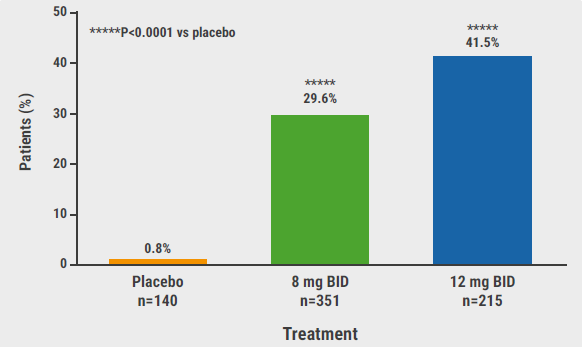https://doi.org/10.55788/6a2a6896
Prof. April Armstrong (Keck School of Medicine of University of California, LA, USA) pointed out that TYK2, an essential component in the JAK/STAT signalling pathway, is an important target in psoriasis as it is central to mediating some of the key pathogenic signals that may be increased in patients with psoriasis [1]. The agent NDI-034858 is a highly selective, oral, allosteric inhibitor of TYK2. By selectively inhibiting TYK2, receptor-mediated activation and downstream signal transduction of immune-related cytokines, like IL-6, IL-10, IL-12 and type I interferon, can be prevented.
At this year’s AAD meeting, the results of the phase 2b, randomised, double-blind, placebo-controlled study (NCT04999839) were presented [1]. The 259 participants with moderate-to-severe psoriasis were randomly assigned to receive 1 of 4 doses of this agent or placebo. The primary endpoint was the percentage of patients who achieved a 75% improvement in the Psoriasis Area and Severity Index (PASI) score at week 12.
At this time, a significantly greater proportion of patients achieved PASI75 at doses ≥5 mg (44%, 68%, and 67% with 5 mg, 15 mg, and 30 mg, respectively) versus placebo (6%; P<0.001 for each comparison). “What we learn from this is that 15 mg and 30 mg were superior to 5 mg, and almost 7 out of 10 achieved PASI75 by week 12,” Prof. Armstrong said. Moreover, 46% of patients achieved PASI90 with the higher doses, which was assessed as a secondary endpoint. Almost one-third of patients achieved PASI100 with the highest dose; “an impressive result for an oral agent,” as Prof. Armstrong pointed out.
Adverse event frequency was 53‒62% with no clear dose dependence in the active arms and 44% in the placebo arm. COVID-19 infection was the most frequent adverse event as the study was performed during the pandemic. One patient experienced 2 serious adverse events considered unrelated to treatment. Additionally, participants presented with acne and folliculitis of the truncal area and diarrhoea. Mean lab values and changes from baseline did not reveal adverse trends in cell counts; however, creatine kinase showed some variability in the high doses. These promising results support further studies of the TYK2 inhibitor in psoriasis.
- Armstrong A. Efficacy and safety results from the randomized, double-blind, placebo-controlled phase 2b trial of TYK2 inhibitor NDI-034858 in moderate-to-severe psoriasis. S025, AAD 2023 Annual Meeting, 17–21 March, New Orleans, USA.
Posted on
Previous Article
« As-needed ruxolitinib shows successful long-term symptom control in AD Next Article
Switching to risankizumab successful in IL-17 inhibitor non-responders »
« As-needed ruxolitinib shows successful long-term symptom control in AD Next Article
Switching to risankizumab successful in IL-17 inhibitor non-responders »
Table of Contents: AAD 2023
Featured articles
New Developments in Dermatology
Delgocitinib shows promise as topical therapy for chronic hand eczema
Vitiligo patients maintain re-pigmentation after ruxolitinib cream withdrawal
Nemolizumab decreases lesions and itch in prurigo nodularis
Lichen planus: a future indication for baricitinib?
Atopic Dermatitis: State of the Art
As-needed ruxolitinib shows successful long-term symptom control in AD
Dupilumab: a viable option for atopic hand and foot eczema
Topical roflumilast beneficial in atopic dermatitis
IL-22 receptor blocker reduces itch and skin lesions in AD
Psoriasis: New Developments
Switching to risankizumab successful in IL-17 inhibitor non-responders
Novel, selective TYK2 inhibitor shows promise for psoriasis
Hidradenitis Suppurativa: What You Need to Know
Izokibep shows remarkably high grades of clinical response in HS
Bimekizumab could be the new up-and-comer for HS treatment
Pearls of the Posters
Biologics in psoriasis: can they prevent joint involvement?
JAK inhibitor deuruxolitinib shows encouraging hair re-growth in alopecia areata
Biomarkers predicting response of different CSU treatments in children
Related Articles

May 15, 2023
Lichen planus: a future indication for baricitinib?
© 2024 Medicom Medical Publishers. All rights reserved. Terms and Conditions | Privacy Policy
HEAD OFFICE
Laarderhoogtweg 25
1101 EB Amsterdam
The Netherlands
T: +31 85 4012 560
E: publishers@medicom-publishers.com

